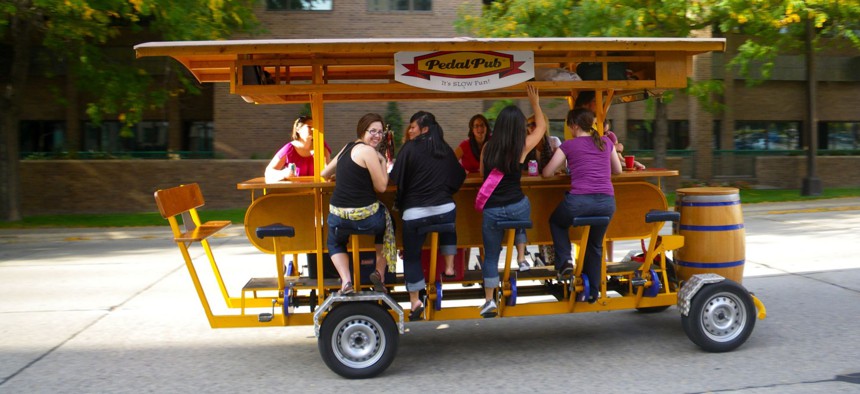Pedal Party Bikes Hit a Bump in the Regulatory Road

A Trolley Pub bike in Minneapolis. Photo by PunkToad / Flickr via CC BY 2.0

Connecting state and local government leaders
Biking-while-boozing businesses operate under a patchwork of rules city to city and state to state. The latest flashpoint is Kalamazoo, Michigan.
City commissioners in Kalamazoo, Michigan, last week voted to ban people from drinking while riding quadricycles, frustrating local supporters of the pedal party bike industry, who say the vote drains much of the revenue-generating fun from the experience.
The unanimous vote last week was a local setback for an “experience entertainment” industry growing in popularity in cities and towns around Michigan and across the country.
"Certainly, there's no shortage of places to consume alcohol downtown," Kalamazoo City Commissioner Matt Milcarek said explaining his vote, according to MLive.
Supporters of the industry said the commissioners were missing the point. They explained that sober pedal party bike business employees drive the vehicles while customers merely pedal, so the cycles are at least as safe as party buses or prom-night limousines.
"This is something that has been successfully implemented in several cities across Michigan, including Ann Arbor, Grand Rapids and Detroit," said Andrew Haan, president of business-development group Downtown Kalamazoo Inc. "As far as I know that's been without incident, and we think it will add to the burgeoning beer culture and beer tourism culture [in Kalamazoo].”
There may have been no major incidents to speak of in Michigan, but there have been incidents elsewhere. In 2013, a Minneapolis pedal pub tipped while taking a downhill turn too fast, leaving 10 riders with minor injuries.
Two years later, also in Minneapolis, a drunk driver crashed into a party bike on the Hennepin Avenue Bridge, sending the cycle into the air. When it landed, it pinned several riders who suffered broken bones, internal bleeding and traumatic head injuries.
Last year, a bus in Madison, Wisconsin, hit a Trolley Pub bike causing minor injuries.
Only one pedal party bike company, P3, was operating in Kalamazoo when the commission’s vote came down. P3 also does business in Ann Arbor and Detroit. Two other companies had approached Kalamazoo seeking permits, MLive reported.
The Kalamazoo City Commission ruling isn’t likely to shut down business altogether. P3, like many pedal party bike companies, also advertises itself as a pub crawl company—an alternative way to move from bar to bar over the course of, say, a college football afternoon or bachelorette party evening.
The Kalamazoo vote is the latest chapter in a regulatory story that has been written by local lawmakers and regulatory bodies across the nation, mostly over the last five years.
There are now pedal party bike businesses operating in dozens of U.S. cities, but the industry continues to operate under a patchwork regulatory regime tied to varying open container laws.
In November, Detroit City Council members went in the opposite direction of their Kalamazoo counterparts, unanimously voting in favor of allowing pub cycles to provide alcohol.
In Texas, where alcohol consumption laws are liberal, pedal party bike companies have thrived.
After years of muddling on the issue, California made party bikes legal statewide in 2015, leaving it to municipal officials to decide whether or not to allow cycle businesses to serve alcohol on board.
Drinking on the cycles was illegal in Wisconsin until a 2014 law made it legal statewide, but again, except in cities that choose to pass laws banning the practice.
John Tomasic is a journalist who lives in Boulder, Colorado.

NEXT STORY: Nearly 2,000 San Francisco Apartment Buildings Don’t Meet Quake Codes




